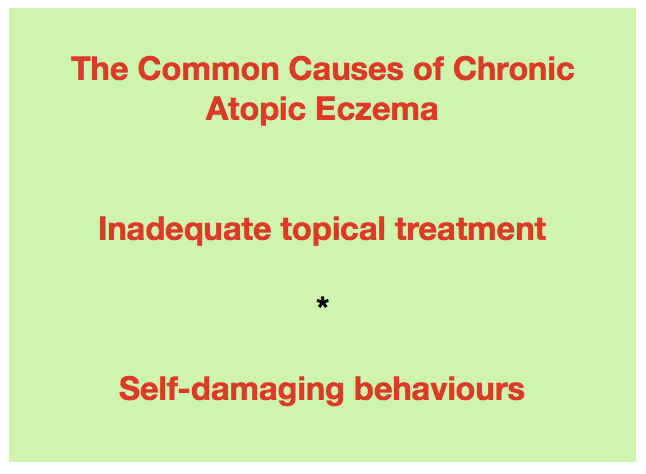The causes of chronic atopic eczema

The two common causes of chronic atopic eczema - eczema that is sometimes better, sometimes worse, but never clears up altogether - are inadequate topical treatment, and habitual self-damaging behaviours. Both are linked to an attitude of passive pessimism, and frustration: when nothing seems to be working habitual scratching increases, and interest in self-management advice wains, while negative quality of life effects accumulate.
Treatment of atopic eczema at some point begins with acute, or new, eczema: a flare-up of acute atopic eczema will respond quickly to prompt and vigorous appropriate topical treatment - adequate use of moisturizer and anti-inflammatory treatment, usually topical steroids, at the correct potency and continued for long enough.
If the treatment of acute eczema is not adequate the eczema becomes increasingly troublesome: characteristic itch leads to repetitive scratching, and to damaged skin that is even more inflamed, and therefore more itchy. The scratching therefore becomes intensified, and as it is repeated it becomes habitual, and linked to circumstance. Thus a long-term or chronic inflammation is the result, relatively resistant to topical treatment. Acute flare-ups are now easily provoked: chronic eczema is more sensitive compared with healthy skin. An understandable pessimism develops and completes the picture.
The Combined Approach to atopic eczema is designed to tackle the causes of chronic atopic eczema. The approach requires optimal use of emollients and topical steroids, achieved by taking time to understand their importance and using a programmed approach that ensures the treatments are followed correctly. Habitual self-damaging behaviours - repetitive rubbing and scratching now often related more to circumstance and mood than to any substantial itch - respond quickly to the simple behaviour modification technique habit reversal.
These two treatment strategies are provided together in combination and coupled to an attitude of positive expectation aimed at the early achievement of identified desired improvements in quality of life. As these appear they reinforce the new coping strategies that the treatment programme teaches - the skin then heals through-and-through, and life without chronic eczema is achieved, with also less and less trouble from acute flare-ups.
There need be no looking back!
Reference
Perspective: Acting on the evidence
Williams H (2011) Nature i Outlook 479 S16
